IAN facilitates Hawaiian Islands Coral Reef Report Card workshop
 IAN kicked off the workshop for the Hawaiian Islands Coral Reef Report Card January 23-24th in Honolulu, Hawaii. This is the third report card for the NOAA Coral Reef Report Card project, following the pilots in American Samoa and Florida. Heath, Caroline, and Alex facilitated the workshop with about 30 participants including people from NOAA, Hawaii Division of Aquatic Resources, University of Hawaii, The Nature Conservancy, and Conservation International. The workshop included great information and discussions about values, threats, indicators, and key stories for Hawaii's coral reefs, including the main Hawaiian Islands and the protected, un-inhabited northwestern Hawaiian islands.
IAN kicked off the workshop for the Hawaiian Islands Coral Reef Report Card January 23-24th in Honolulu, Hawaii. This is the third report card for the NOAA Coral Reef Report Card project, following the pilots in American Samoa and Florida. Heath, Caroline, and Alex facilitated the workshop with about 30 participants including people from NOAA, Hawaii Division of Aquatic Resources, University of Hawaii, The Nature Conservancy, and Conservation International. The workshop included great information and discussions about values, threats, indicators, and key stories for Hawaii's coral reefs, including the main Hawaiian Islands and the protected, un-inhabited northwestern Hawaiian islands.
The Mariana Islands are a unique part of the United States
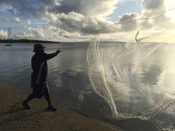 Guam and Saipan are both islands in the Mariana Archipelago and belong to two different US territories. Guam is it's own territory at the southern end of the island chain, and Saipan is part of the Commonwealth for the Northern Mariana Islands (CNMI), which includes all the other islands. IAN traveled to Guam and Saipan to conduct report card workshops for the Mariana Islands. This is the fifth report card for the NOAA Coral Reef Report Card project, following the pilots in American Samoa and Florida. Heath, Caroline, and Alex facilitated the workshops with about 25 participants. The Mariana Islands have not only a rich diversity in coral reefs, but also a fascinating history of colonization by many groups, from the Chamorros to the Americans.
Guam and Saipan are both islands in the Mariana Archipelago and belong to two different US territories. Guam is it's own territory at the southern end of the island chain, and Saipan is part of the Commonwealth for the Northern Mariana Islands (CNMI), which includes all the other islands. IAN traveled to Guam and Saipan to conduct report card workshops for the Mariana Islands. This is the fifth report card for the NOAA Coral Reef Report Card project, following the pilots in American Samoa and Florida. Heath, Caroline, and Alex facilitated the workshops with about 25 participants. The Mariana Islands have not only a rich diversity in coral reefs, but also a fascinating history of colonization by many groups, from the Chamorros to the Americans.
Now available - Coral reef status reports for the Pacific jurisdictions
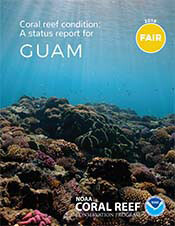 Effective coral reef conservation cannot be accomplished without an informed and engaged public. Read the five coral reef status reports to find out more! These coral status reports provide communities and decision-makers with information about managing and conserving coral reef ecosystems in five Pacific jurisdictions (American Samoa, the Hawaiian Archipelago, the Pacific Remote Islands, Guam, and the Northern Marianas Islands. These status reports provide a geographically specific assessment of each jurisdictions' coral reef condition using four categories of coral reef health: corals and algae, fish, climate, and human connections. This project is a partnership between IAN and NOAA's Coral Reef Conservation Program.
Effective coral reef conservation cannot be accomplished without an informed and engaged public. Read the five coral reef status reports to find out more! These coral status reports provide communities and decision-makers with information about managing and conserving coral reef ecosystems in five Pacific jurisdictions (American Samoa, the Hawaiian Archipelago, the Pacific Remote Islands, Guam, and the Northern Marianas Islands. These status reports provide a geographically specific assessment of each jurisdictions' coral reef condition using four categories of coral reef health: corals and algae, fish, climate, and human connections. This project is a partnership between IAN and NOAA's Coral Reef Conservation Program.
Atlantic Coral Reef Status Reports
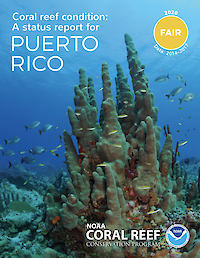
Separate reports were published for each U.S. Atlantic reef: Florida, Flower Garden Banks, Puerto Rico, and U.S. Virgin Islands. Reef status ranged from good to impaired.
National Coral Report

Years in the making, Coral reef condition: a status report for U.S. Coral Reefs synthesizes data to determine the health of Pacific and Atlantic coral reefs. Nine jurisdiction-specific coral status reports were published prior to this national report. For more information, visit the Coral Reef Information System or our reef project page.
U.S. Coral Reefs are in fair condition, but vulnerable to further decline
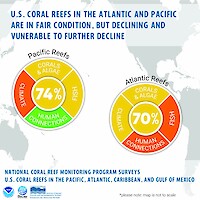
On November 10th, IAN held a press event with NOAA'S Coral Reef Conservation Program to launch the national coral reef status report. Years in the making, Coral reef condition: a status report for U.S. Coral Reefs synthesizes data from four categories (corals & algae, fish, climate, and human connections) to determine the health of Pacific and Atlantic coral reefs. The report is designed to be accessible for the general public and policy makers, utilizing color-rich visuals and descriptive text. Nine jurisdiction-specific coral status reports were published prior to this national report. For more information, visit the Coral Reef Information System or our reef project page.
Upcoming meetings and conferences
IAN projects and employees will be attending and presenting at a variety of virtual conferences this spring and summer, including:
- At the upcoming National Monitoring Conference this month, Caroline Donovan will present on behalf of the Cheseapeake Monitoring Cooperative.
- At the Citizen Science conference CitiSciVirtual: Local, Global, Connected in May, Caroline Donovan will attend on behalf of the Chesapeake Monitoring Cooperative. Look for the CMC's viritual poster!
- At the International Coral Reef Symposium in July, we will present the Coral Reef Ecosystem Status and Trends Report Cards
Three IAN report cards received Hermes Creative Award
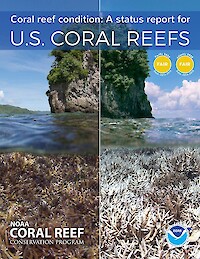
"The Hermes award is an international awards competition of approximately 6,000 entries for creative professionals involved in the concept, writing, and design of traditional and emerging media. Hermes Creative Awards recognizes outstanding work in the industry while promoting the philanthropic nature of marketing and communication professionals. The Platinum award is the highest-level designation, and the three UMCES campaigns reached over 700 million people in watershed communities." (Associated Press)
The three projects highlighted by this award are the Coral Reef Condition Status Reports, the 2019 Chesapeake Bay Watershed Report Card, and the Western Lake Erie 1st Report Card. We are proud to share this award with our partners at Yes& Agency, and are deeply grateful to all of our staff who made these projects possible.
14th International Coral Reef Symposium held virtually last month
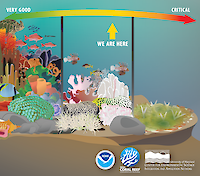
The 14th International Coral Reef Symposium was held virtually from July 19 to 23, 2021. This virtual conference took place instead of the in-person conference in 2020. ICRS is the most important coral reef conference in the world. It usually only occurs once every four years and draw experts from all around the globe. During the virtual coral reef conference last month, Heath Kelsey and Caroline Donovan, along with our colleague Erica Towle (NOAA Coral Reef Conservation Program) presented our work on coral reef status reports, which evaluated the health of coral reefs in nine individual U.S. jurisdictions and overall (nationally). It was great to "see" some of the other partners from this project presenting during the conference as well.
Paper publication: NOAA Coral Reef Assessment
Several IAN staff participated in writing a paper on the methods and results of our far-reaching coral reef ecosystem status reports. This project lasted for six years and generated ten separate reports on the status of the coral reefs under U.S. jurisdiction. The national report in 2020 summarized jurisdiction reports. U.S. Atlantic and Pacific coral reefs were scored separately; each region of coral reefs is in fair condition overall. The reefs range from moderately impacted to very impacted by changing conditions such as disease and habitat degradation.